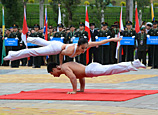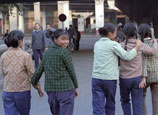
"Resources are not utilized. Departments that have funds don't know how to use them and carry out effective policies, while non-governmental organizations and talented people don't have enough money to help," Ma added.
Mametjuma Mametakun, a Manaschi with the song and dance ensemble of Kirgiz Autonomous Prefecture of Kizilsu, said younger generations are not willing to learn the epic poem.
"Children love the story of the heroic Manas when I tell it to them, but they only want to listen," he said.
"Manas is unique because we express emotions with exaggerated body movements. When we sing to the settings of war, we imitate the horses' neighs, the soldiers' shouts and Manas's heroic posture," Mametakun added.
Adel Jumaturdu, a researcher at the Chinese Academy of Social Sciences, said learning both the song and the movements requires a long-term commitment, and the government should provide aspiring Manaschi with higher subsidies and job opportunities in song and dance ensembles and culture departments to encourage them to improve their skills.
"Singing the epic is the only way to keep it alive. Printing the text can only serve academic research purposes," said Adel Jumaturdu.
To cultivate an audience, Tolanhan, a political advisor to the government of Akqi County, suggested setting up a museum to make the history of, and artifacts related to, the epic available to the public.
Public spaces where professional singers, Kumuzi players and Manas lovers can meet regularly to perform, learn from one another and exchange their ideas should be set up, as well, said Adel Jumaturdu.

















![]()
